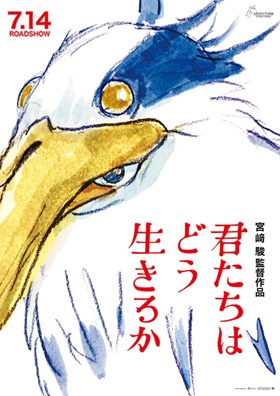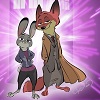Review: 'The Boy and the Heron'
 The Boy and the Heron was released earlier in the year in Japan by Studio Ghibli, with no trailer and minimal advertising, the point being made that it is a movie by Hayao Miyazaki from Studio Ghibli. Like, if you know, you know, and if you don't, keep mum because the people who know will judge you. In America, GKIDS is the distributor, and they mostly kept to this same strategy, though as it had already been out in Japan over half the year and had it's Western debut at the Toronto International Film Festival, so they did eventually release a trailer. The film is available in Japanese with English subtitles, or English dubbing; both versions were available at my local cinema, so unless you're situated in a very rural area, it shouldn't be that hard to find your preference. This review is based on the English dubbed version; Ghibli films have traditionally had good English dubbing, and this film is no exception.
The Boy and the Heron was released earlier in the year in Japan by Studio Ghibli, with no trailer and minimal advertising, the point being made that it is a movie by Hayao Miyazaki from Studio Ghibli. Like, if you know, you know, and if you don't, keep mum because the people who know will judge you. In America, GKIDS is the distributor, and they mostly kept to this same strategy, though as it had already been out in Japan over half the year and had it's Western debut at the Toronto International Film Festival, so they did eventually release a trailer. The film is available in Japanese with English subtitles, or English dubbing; both versions were available at my local cinema, so unless you're situated in a very rural area, it shouldn't be that hard to find your preference. This review is based on the English dubbed version; Ghibli films have traditionally had good English dubbing, and this film is no exception.
The Boy and the Heron is Hayao Miyazaki's return to feature animation direction after his "retirement" following The Wind Rises in 2013. Like The Wind Rises, The Boy and the Heron was supposed to be his last movie, but also probably won't be; he reportedly doesn't enjoy the actual process of making movies, but does enjoy having made them. He's best known for Spirited Away and My Neighbor Totoro, fantasies in which children are drawn into strange new worlds bordering our own. The Boy and the Heron follows along those lines, and though it does contain elements of what is commonly described as "whimsy", it also feels more adult-oriented.
To be clear, I mean "adult" in a purely descriptive manner. If My Neighbor Totoro, ultimately, feels like a movie more aimed at a younger audience, this is not a slight on My Neighbor Totoro. Or for that matter, a recommendation of The Boy and the Heron over Totoro, which I would still probably give preference to. I'd also point out that The Boy and the Heron also isn't "more adult" for content reasons. Though it is a thematically darker movie, I'm not saying a child will be necessarily traumatized by the experience. But The Boy and the Heron, despite its child protagonist and fantasy trappings, feels aimed at an older audience.
The Boy and the Heron follows the young boy Mahito during World War II-era Japan. His mother dies during a fire; the movie does not specify whether this is a result of the war, or an accident. A few more years into the war, his father, who is is an industrialist who makes canopies for Japanese fighter planes, moves Mahito to the country around his factory, where he meets his new stepmother. He soon finds himself haunted by a Grey Heron, who is capable of speech and tells him he has been summoned to a strange abandoned mansion nearby. When his stepmother goes missing, his attempts to rescue her send him to a fantasy world, where the Heron becomes his guide.
The first part of the movie plays more like a ghost story, while second part is more a traditional fairy tale. We are introduced, with the character, to a new location, given hints that it has a slightly unsavory past, and witness a series of slowly escalating oddities. The heron, when introduced, seems like a normal bird, though we're suspicious of it from the outset, if for no other reason than this movie is called The Boy and the Heron. An early disturbance is a shot of the heron smiling with a full set of teeth. Sure, it's common enough for cartoon birds to do this in more traditional funny animal comics and animated films, but with the more naturalistic style used here, it comes off as an odd form of body horror, which becomes more pronounced with subsequent appearances. The heron eventually reveals a much more human form, though it grows in ugliness in its more humanoid form, with a grotesque appearance.
In the dub, Robert Pattinson plays the heron, and he gives a vocal performance that matches the onscreen creature, to the point he is unrecognizable. On one hand, the voice he uses is both creepy enough that it fits for both a supernatural presence during the early scenes, but humorous enough when the character morphs into a fairy tale helper in the later story section it still fits. On the other hand, it's such a voice actor performance, I wonder why they didn't just use a voice actor.
It hardly needs said that The Boy and the Heron's animation is strong, because this is Studio Ghibli directed by Hayao Miyazaki. If you know, etc. But, as major hand drawn theatrical releases have become rarer and rarer, it's nice to see it once again on the big screen.
Movies in theaters haven't been having a good time with general audiences, with the pandemic still not really recovered from, as audiences have gotten used to not watching them in theaters as much. Add in the actors and writers' strikes earlier this year, and it has been a weird time. The silver lining is that, for people that like to go to the movies, instead of the movies coming to them, it is a weird time. I watched The Boy and the Heron, then turned around and bought a ticket for Godzilla Minus One. Two Japanese-language movies in my not very big market is insane. I don't know if it will last, and the reasons behind it are a bit problematic, but I'm going to appreciate it while I can.

About the author
2cross2affliction (Brendan Kachel) — read stories — contact (login required)a red fox
New teeth. That's weird.
Comments
I was fortunate to actually see this in Japan. Not only that, but I caught its very last showing in Hiroshima at the end of a 100-day run. (Which is impressive, but Spirited Away was in Japanese cinemas for more than six months.)
Should be noted that the BAFTAs first awarded Best Animated Feature in 2006, three years after Spirited Away won the Oscar for the same category. In all likelihood, it would have won the BAFTA that year as well. So, the Animated Feature Oscar is going to be fun; will it be Brave, or Kubo and the Two Strings?
Post new comment